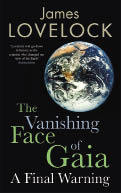The Vanishing Face of Gaia: A Final Warning, by James Lovelock
He Knew He Was Right: The Irrepressible Life of James Lovelock and Gaia, by John Gribbin and Mary Gribbin
James Lovelock is an English scientist, recip- ient of many awards, and he is a pleasant writer, moderate in tone and conciliatory towards his critics. In the late 1960s he became famous in New Age circles for his Gaia theory. The name, which is that of the old Greek goddess of Earth, was suggested to him by William Golding, his neighbour and pub companion in their Wiltshire village. It was immediately popular, and so was the image that Lovelock attached to it, of a self-regulating planet that has been working throughout its existence to develop the atmosphere, climate and other conditions necessary for sustaining life. Lovelock does not claim that Gaia is literally a living creature, but he answers objections by the evolutionists, who detest anything that smacks of teleology (the idea of purpose in nature), by saying that she is ‘alive’ in the same way that Richard Dawkins’s genes are ‘selfish’.
The ultimate product of Gaia is ourselves. That, according to Lovelock, is where the trouble starts. We are, he believes, like parasites, undoing all Gaia’s good work, destroying her forests, poisoning her body and veins and diminishing the diversity of her plant and animal species. This has been going on for a long time, from when we were slash-and-burn nomads, and it has greatly intensified in modern times, with the industrial revolution followed by the wasteful elaborations of our global economy.
Unless we do something about this, very soon and very radically — reduce our numbers, stop eating meat, stay at home and give up most of the comforts we have become used to — Gaia will turn upon us with a vengeance. Temperatures will rise intolerably, whole continents will become deserts and the survivors among us will fight for living-space on the few parts of the earth which will remain fairly habitable. These likely refuges are mainly island countries, such as Tasmania, New Zealand, Japan and the British Isles. In that case we shall have the unpleasant choice between being swamped by needy immigrants and repelling them by force. As Lovelock puts it, ‘Soon we face the appalling question of who we can let aboard the lifeboats and who must we reject.’
There is something very wrong with this way of thinking. Since the glory days of his Gaia vision, Lovelock, who is now nearly 90, has become ever more in thrall to scientific literalism and the deterministic view, based on current beliefs and prejudices, which fails to acknowledge the total unpredictability of future events. The fall of communism and the crash of the global economics system were not widely foreseen, and there are many beliefs and theories, now dominant, that will one day be overturned. One of these could be the strictly upheld doctrine of evolution by natural selection and its dubious application to history, sociology and other subjects. Lovelock’s low view of human nature has its roots in Darwinian theory, and so does his eccentric belief or hope, expressed at the end of this book, that a new race of man will evolve in tune with the interests of Gaia.
The Gaia concept was a grand feat of imagination, but Lovelock has never realised its potential because, like virtually all modern scientists and scholars, he totally ignores the ancient, traditional code of science, whose principal image is the living, self-sustaining universal creature described in Plato’s Timaeus. Gaia is its microcosm, a being with its own soul and animated by spirit. This was the perception of our nomadic ancestors whose lives were enriched by regular contact with the spirits and powers of nature. Later, in times of settlement when agriculture and its associated crafts raised the productivity of the land, the ritualised arts of geomancy reconciled the interests of the living with those of the ancestral dead and produced the social-economic-spiritual ideal of a landscape that was densely, richly populated while retaining its primordial beauty and diversity. Two examples of this are the populous, sanctified landscape of old China and, nearer home, the once rich and highly cultured islands and uplands of Scotland, now largely deserted. Is Lovelock justified in blaming the ailments of Gaia on the number rather than the disposition of her inhabitants? And what about his advocacy of nuclear power stations rather than the development of local and natural sources of energy?
James Lovelock is a clear, principled, independent thinker, so he is bound to be controversial and no one is likely to agree with the whole range of his ideas and proposals. But there is no doubting his simple goodness and honesty, nor is there any question about his natural scientific genius. These qualities shine through his authorised biography by science writers, John and Mary Gribbin. The impression they give is of a charming, humorous, modest fellow with whom you could happily discuss any topic under the sun, whether you agreed with each other or not.





Comments